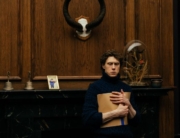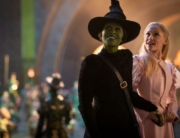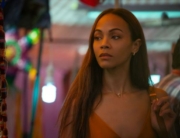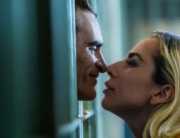
Kevin Parent as Antoine (Adopt Films)
Produced by Pierre Even & Marie-Claude Poulin
Released by Adopt Films
French with English subtitles
Canada/France. 120 min. Not rated
With Vanessa Paradis, Kevin Parent, Hélène Florent, Évelyne Brochu, Marin Gerrier & Alice Dubois
Directed and written by Canadian filmmaker Jean-Marc Vallée (whose last film was the enchanting period piece The Young Victoria), Café de Flore relies heavily on the illuminating relationship between music and memory. Characters utilize memories of specific songs, including one which gives the film its title, to both sooth and trigger emotions. Taking place in two different cities and time periods, the film connects two seemingly unrelated stories through sound and the concept of past lives. The idea that the contemporary Quebecois are reincarnations of characters living in 1960s Paris doesn’t quite pack the emotional punch the film attempts to create. That being said, the use of sound and music to connect imagery illuminate the stories very well, so much so that it left me wishing Café de Flore would have left the reincarnation theme behind to focus solely on the two interlinked tales.
Antoine (Kevin Parent), a well-known D.J., lives with his girlfriend, Rose (Evelyne Brochu), in Montreal. It has been two years since he separated from his wife, Carole (Hélène Florent), with whom he has two young daughters. Antoine and Carole have been together since they were teenagers, and their breakup has left Carole emotionally traumatized. She sleepwalks, has turned to drugs, and has recurring nightmares. Antoine, though completely in love with Rose, deals with his own guilt, especially with concern to his daughters, by going to a therapist.
Paralleling Antoine and Carole’s story is Jacqueline’s. A single mother living in Paris in the 1960s, Jacqueline (Vanessa Paradis) struggles to raise her seven-year-old son, Laurent (Marin Gerrier), who has Down syndrome. He relies on her solely and she devotes herself to his well-being as well as his education and his navigation in an often cruel world. When Laurent becomes attached to a classmate, a girl who also with Down syndrome, Jacqueline becomes distraught. She can’t handle the idea that Laurent may have found someone he needs and loves as much as her. Her fear of losing him and no longer having a purpose in her life drives Jacqueline to make some drastic decisions.
These stories are fluid, moving between not only both eras but also within flashbacks in each story—to the early days of Carole and Antoine’s relationship and the birth of Laurent. Pink Floyd’s Dark Side of Moon is the central musical theme. The dark and moody music gives the sections a similar tone, though other music peppers the soundtrack as well. Eighties alternative songs come to represent Antoine and Carole’s relationship while Laurent is obsessed with a certain French vinyl record, and most of this music travels between both time periods.
It’s the music which makes these parallel narratives come to life. However, the film tries to justify their loose connection with a plot point about Carole’s obsession with past lives and reincarnation, which takes away a bit from the film’s fluidity and magic. The music and similarities between the stories do that job just fine, and Carole’s fascination doesn’t quite have the depth the film wishes it had. What makes Café de Flore a unique film is its use of imagery in connection to music and memory. The rest hinders what is a borderline experimental feast for the senses, like an overly long music video, in the best way possible.






Leave A Comment